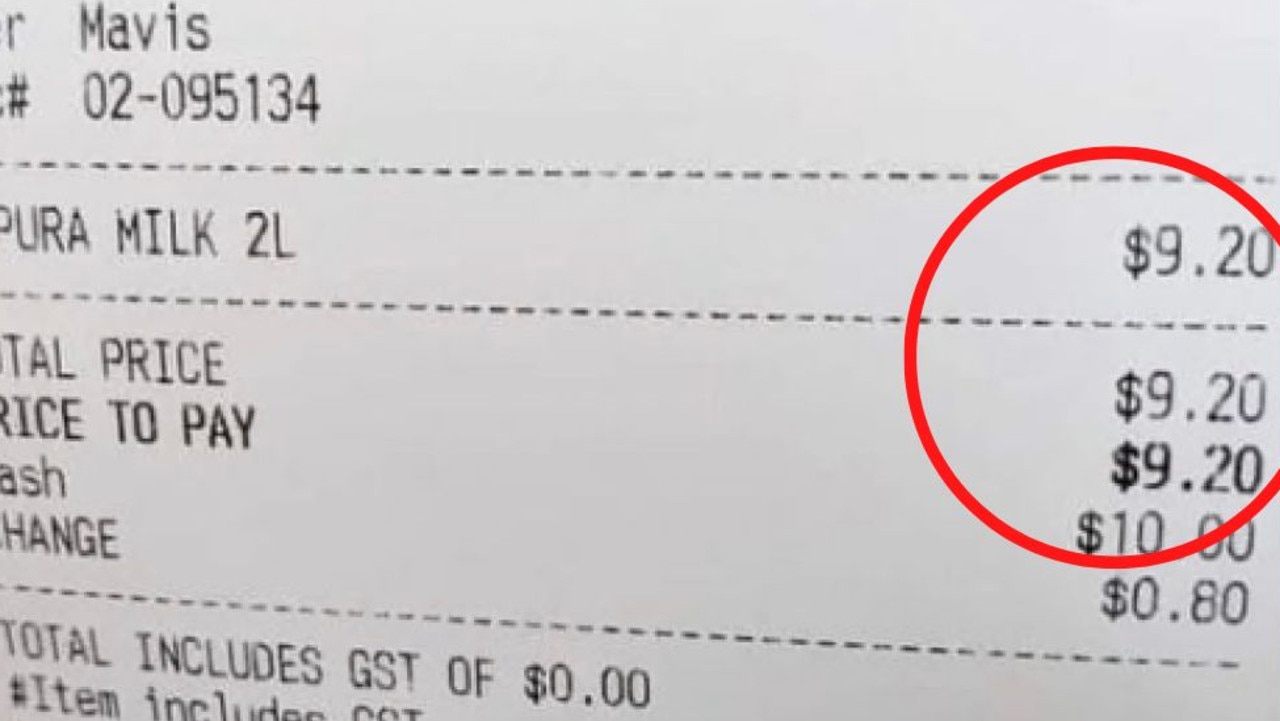With grocery bills rapidly increasing due to supply chain issues and rising inflation, all Australians are feeling the pinch. But in remote Aboriginal communities, the situation is even more dire.
A social media post of a receipt from the Docker River store in the remote indigenous community of Kaltukatjara, in the Northern Territory – where many families already live close to the breadline – showed a 2L bottle of Pura Milk cost $9.20.
While supermarket chain Aldi has warned grocery prices will “inevitably” continue to rise after the inflation rate surged to 6.1 per cent, by comparison, at a Sydney Woolworths, the same product this week cost $3.10.
In the post from April 26, Facebook user Spirit Walker pleaded with former aboriginal affairs minister Ben Wyatt to step in to help those living in the small township, southwest of Alice Springs.
“!!!Getting close to $10 dollars to pay 2L milk out in Aboriginal communities soon!!!” he wrote. “You need to do (some) more work aboriginal affairs minister Ben Wyatt because this is going beyond the joke now uncle?
“(Help get this food price back down low again out in community.)”
He added: “Prices like this for everyday goods has been the experience for Aboriginal people since the first stores opened.”
Back in December 2021 during the Morrison government’s Food Security inquiry, Mr Wyatt said “Improving food security and making affordable, fresh and nutritious foods more available in remote indigenous communities is an important part of improving the health and wellbeing of Aboriginal and Torres Strait Islander people .”
But Spirit Walker insisted since then “nothing has been done” to resolve the cost of living crisis.
The post hit a nerve on the social media platform, receiving 602 reactions, 346 shares and 183 comments, with one Facebook user branding the hefty price tag “highway robbery”, while others stated the situation was “disgusting” and a “disgrace”.
“That’s completely unfair and taking advantage of people that are living under the poverty line, it’s inhumane and as far as I am concerned it’s against basic human rights to not be able to access fairly priced food, goods and services,” one wrote.
Another commented, “I have a feeling it’s going to get a lot worse, the entire supply chain relies on a fragile system and finite energy sources. Time to decentralize again and look to community farming.”
The indigenous township of Kaltukatjara had a population of 355 at the 2006 census.
One social media user defended the store, stating: “The shop has to supply BBQs for the whole community throughout the year.
“It has to provide food hampers for Xmas and other occasions when community members need to attend other communities for funerals, etc. The shop has to pay for the bus service to get them there. The last one I knew of was $6000.
“How are these services to be provided if the shop doesn’t make a profit …”
Donna Donzow, an operations manager for the non-profit EON Foundation which helps grow and supply fresh produce to communities in Western Australia and the Northern Territory, told 7NEWS.com.au she noticed a mixed salad pack was $17 in Minyerri, a town 240km southeast of Katherine, in June.
The same product cost a mere $3 at a Sydney Woolies this week.
Guardian reported that a 2021 Amsant report showed groceries were 56 per cent more expensive in remote communities than regional supermarkets in the Northern Territory due to poor quality roads and long supply chains.
According to Rob Totten, store manager of a supermarket in Maningrida, Arnhem Land in the Northern Territory, the price of some food products had “gone through the roof”.
“Baked beans have gone from $29.95 to $33.80 a carton. One carton of corned beef was $151 in April and it’s now $176,” he told TheGuardian.
.
